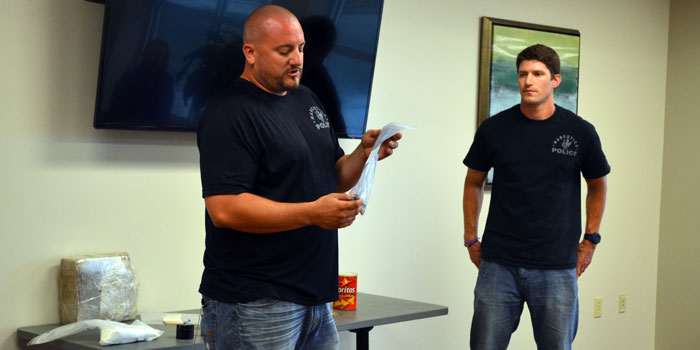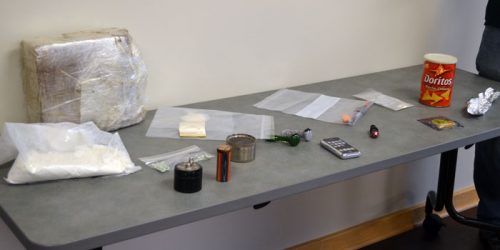Parents Learn The Tough Stuff About Drugs

Detective Sergeant RJ Nethaway, Narcotics, Warsaw Police Department, left, and Trooper Andrew Cochran, Meth Suppression, Indiana State Police, talk to parents about drug addiction in teens. (Photos by Amanda McFarland)

Nethaway and Cochran had examples of drug paraphernalia so those gathered could see what to look for.
WARSAW — A roomful of parents gathered Wednesday evening, Aug. 24, at the Parkview Warsaw YMCA to learn about teens, drugs and prevention.
Detective Sergeant RJ Nethaway, Narcotics, Warsaw Police Department and Trooper Andrew Cochran, Meth Suppression, Indiana State Police teamed up for a brief seminar to teach parents how to identify signs their teens may be doing drugs, what to do about and how to prevent drug use.
Nethaway and Cochran showed examples of paraphernalia, from needles to cut-off straws to tinfoil folded in certain ways.
“If you find these things in your home, it’s a pretty good indicator somebody is doing drugs,” Nethaway said.
They also explained physical and behavioral indicators, like tics and nervous habits. Sore spots from picking at the skin, dark circles under the eyes, receding gums, rotting teeth, dull hair and lack of personal care are also signs.
“What is important to them in their life is to get high,” Nethaway said.
They also explained how quickly a narcotic addiction can progress.
“Someone [addicted to drugs] says they won’t ever inject, inevitably you come back a few months later and they’re injecting,” Cochran said.
The high from meth, they said, is so potent, users become addicted the first time. Meth addiction can be accidental, such as a teen attending a party and drinking a laced beverage. As far as heroin, they explained an overdose can happen even if the person uses the same amount as usual but happens to have a “bad batch.”
“It could be your first time or it could be your 10,000th time,” Cochran said.
Nethaway and Cochran encouraged parents not to worry about making their teens angry when it comes to preventing drug, even if it means forbidding them to see a certain friend. Once a person is addicted, they added, more than likely they will stay that way.
“It’s been my experience that if you don’t want off the drug, you won’t get off the drug,” Cochran said. He also noted, “The way to fight it is to prevent the first use.”
In response to a parent’s question, Cochran noted meth is a problem at the high school level, though he has seen students as young as 13 involved with meth.
Marijuana can lead to use of more potent drugs, Cochran added. For example, if someone gets high on marijuana at a party, they may be more susceptible to persuasion to try other drugs. Synthetic drugs, he said, are also highly dangerous.
They concluded by, again, encouraging parents not to hesitate to say something if they suspect someone is using drugs.
“Unless we have that information, we can’t do anything with it,” Nethaway said.
“I would not sit on the information because, if you do, we can’t do anything with it,” Cochran said.
They also encouraged parents to talk to their teens.
“If you’re talking, they’re listening,” Nethaway said. “They may be defiant, they may not like it, but they’re listening.”
